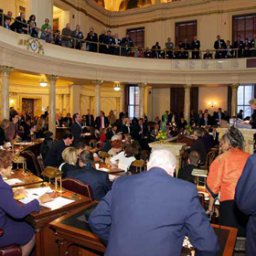
Measure Would Allow Unpaid Leave for Victims of Domestic Violence or Sexual Assault
TRENTON – Legislation sponsored by Senators Fred H. Madden and Jim Beach that would provide unpaid leave for victims of domestic violence or sexual assault was approved today by the full Senate.
“The devastating effects of domestic violence and sexual assault linger on long after the physical scars heal, and victims of these crimes should not have to bear the burden alone,” said Madden, D-Gloucester and Camden. “Our current system does not do enough to protect survivors of domestic abuse and sexual assault from termination and discrimination in the workplace. It is crucial that we pass this legislation so that victims and their families can get their lives back together and obtain the medical and judicial assistance they need.”
The bill, S-2177, also known as the “New Jersey Security and Financial Empowerment Act” or the “NJ SAFE Act” would provide 20 days of unpaid leave time to an employee who is the victim of domestic violence or sexual assault or whose parent, child, spouse, or civil partner was the victim. The leave could be taken within one year of the incident, and used intermittently in intervals of no less than one day. Provided that the employee has not exhausted the allotted 20 days for the 12-month period, each violent incident would constitute a separate incident for which a victim is entitled to unpaid leave. Provisions of the bill would not apply to employers with less than 25 employees for each working day.
“Although incidents may take place in the confines of the home, domestic violence and sexual assault follow victims into the workplace, resulting in undue hardship and putting victims at risk of losing their jobs,” said Beach, D-Camden. “By taking time off from work, survivors will be able to pursue necessary medical attention, relocate to a safe place, and attend court hearings – all of which are critical to the healing process.”
Under the bill, an employee may elect or an employer may require an employee to use accrued paid vacation leave, personal time, or medical leave during any part of the 20-day period of unpaid leave authorized by the bill. In such a case, paid leave would run concurrent to the unpaid leave and follow the employer’s applicable paid leave policy. The bill would also require an employer to conspicuously display employees’ rights and obligations pursuant to this bill, and prohibit an employer from committing or threatening discharge, harassment, retaliation, or other discrimination against an employee with respect to any leave to which the employee is entitled by this bill.
Leave time would allow the victim or parent, child, spouse, or civil partner of the victim to: seek medication attention for physical or psychological injuries; obtain services from a victim services organization; pursue psychological or other counseling; participate in planning like temporary or permanent relocation to increase safety; seek legal assistance; and attend, participate in, or prepare for a criminal or civil court proceeding.
According to Legal Momentum, a New York-based advocacy group, victims of domestic violence lose an average of 137 hours of work per year. Some victims need time off to seek medical attention, obtain a restraining order, or relocate to a safe place. Others are prevented from getting work when an abuser disables or takes the car, sabotages childcare arrangements, or leaves the victim without cash to use public transportation. These problems have led 11 states, including California, Florida, Illinois, Washington, and the District of Columbia to enact laws providing victims or witnesses to domestic violence the right to take some time off work, according to the University of Kentucky Center for Poverty Research.
The bill was approved in the Senate by a vote of 38-0. It now heads to the General Assembly.


